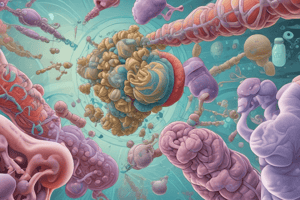Podcast
Questions and Answers
Which antimicrobial agent disrupts cell membrane integrity?
Which antimicrobial agent disrupts cell membrane integrity?
- Quinolones
- Aminoglycosides
- Polymyxins (correct)
- D-cycloserine
Which antimicrobial agent acts as a competitive inhibitor of essential metabolites biosynthesis?
Which antimicrobial agent acts as a competitive inhibitor of essential metabolites biosynthesis?
- Rifampicin
- Macrolides
- Sulphonamides (correct)
- Glycopeptides
Which antimicrobial agent inhibits nucleic acid synthesis?
Which antimicrobial agent inhibits nucleic acid synthesis?
- Tetracyclines
- Amphotericin
- Bacitracin
- Griseofulvin (correct)
Which antimicrobial agent is an inhibitor of protein synthesis?
Which antimicrobial agent is an inhibitor of protein synthesis?
Study Notes
Antimicrobial Agents
- Polymyxins and polyenes disrupt cell membrane integrity, ultimately leading to cell lysis.
- Sulfonamides act as competitive inhibitors of essential metabolites biosynthesis, specifically inhibiting the enzyme dihydropteroate synthase.
- Quinolones and rifampicin inhibit nucleic acid synthesis, targeting DNA gyrase and RNA polymerase, respectively.
- Aminoglycosides, macrolides, and tetracyclines inhibit protein synthesis, binding to the 30S and 50S ribosomal subunits.
Studying That Suits You
Use AI to generate personalized quizzes and flashcards to suit your learning preferences.
Description
Test your knowledge of antimicrobial agents and their mechanism of action in this quiz. Learn about the selective toxicity of antibiotics to microbial cells and the different ways they inhibit bacterial growth.





